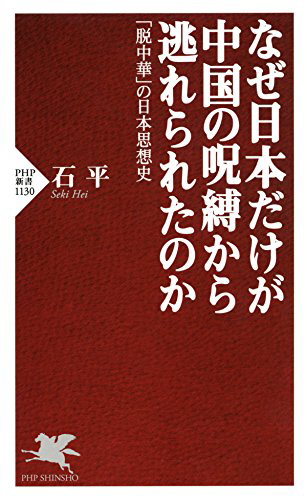

昨日はここ1年以上の仕事上の懸案がようやく落着しました。
そういう日には同時にいろいろの懸案もメドがつくもので、
よく「一粒万倍日」という言い方がありますが、
そういうことに近かったのではないかと思っています。
いまのところ、内容については伏せておきますが、
一段落ついて、まるで「牢屋」から解放されたような気分(笑)。
歳を取ってくると多少なりとも仏が身近にはなってくる。
人間は必ず死ぬわけで生死について考える機縁として
これまで生きてきた先人たちも同様に宗教としてこのことを考えたに違いない。
そういうことが自然に受け入れることができるようになる。
写真は四国で出会った仏像ですが、その素朴さに打たれております。
で、これまでもたくさん仏教について考え続けてきたのですが、
中国から日本に帰化された石平さんの
「なぜ日本だけが中国の呪縛から逃れられたのか」という本を最近読んでおります。
かれは天安門事件以前の改革開放の中国で北京大学哲学科で学ぶ青年期を過ごし、
それが強権的に弾圧されて以降、日本に来て結局帰化した。
忙しい中で寝る前にすこしづつ読み進めているのでまだ読了できていないのですが
仏教受容についての中国側からの日本分析という視点が新鮮に思っています。
文中で、日本に仏教が導入されたその「動機」について
多くの日本の文献や研究を調査したがそういう視点での研究はなかったと述べている。
であれば、自分でまとめてみるしかないということ。
たしかにわたしも日本に仏教が導入されたその動機研究って
聞いたことがなかったし、北京大学哲学科の学究として
中国大陸視点から日本の精神文化を掘り起こすコンセプトは魅力的。
中国や大陸では精神文化の基盤は「儒教」が強固であって、
インド由来の世界宗教・仏教は受容と迫害を繰り返してきた。
その動因分析も踏まえながら、ではなぜ日本は仏教がメインカレントになったのか
そのことに思索を向けて探究されているのですね。
このような視点を提示されてみて、はじめて頓悟するような部分が多い。
明治以降、アジアでもっとも「欧米受容」をなぜ日本が先導したのか、
その起点を聖徳太子段階の「国家戦略」視点で分析している。
精神史、というような分析領域になるのだと思われるのですが
たしかに強く惹かれる視点だと思っております。
しかし、はじめに書いたような次第で読み始めるとすぐに寝落ちする(泣)。
残念な状態なのですが、知的好奇心はたいへん刺激してくれる。
ということで、本日は読書(中)感想とやや軽めのブログとしました(笑)。
読了後、また続きを書きますのでよろしく。
English version⬇
[Meaning of Japanese spiritual assets and Buddhism]
Yesterday, my work concerns for over a year have finally settled down.
On such a day, various concerns will be raised at the same time.
It is often said that “one grain is ten thousand times a day”,
I think it was close to that.
For now, I’m not going to talk about the content,
With a paragraph, I feel like I’ve been released from the “prison” (laughs).
As we get older, the Buddha becomes more and more familiar.
Humans always die, so as an opportunity to think about life and death
The ancestors who have lived so far must have considered this as a religion as well.
You will be able to accept such things naturally.
The photo shows a Buddha statue I met in Shikoku, but I was struck by its simplicity.
So, I’ve been thinking about Buddhism a lot,
Mr. Hei Seki, who was naturalized from China to Japan
I recently read a book, “Why only Japan escaped the curse of China.”
He spent his youth studying at Peking University’s Philosophy Department in China, which was reformed and opened before the Tiananmen Square Incident.
After it was cracked down, he came to Japan and eventually naturalized.
I haven’t read it yet because he’s busy reading a little bit before going to bed.
I think the perspective of Japan’s analysis of Buddhist acceptance from the Chinese side is fresh.
In the text, about the “motivation” for the introduction of Buddhism in Japan
He has researched a lot of Japanese literature and research, but states that no research has been done from that perspective.
If so, you have no choice but to put it together yourself.
Certainly, I also studied the motives for the introduction of Buddhism in Japan.
I’ve never heard of it, and as a scholar of the Department of Philosophy at Peking University
The concept of digging up Japanese spiritual culture from the perspective of mainland China is fascinating.
In China and the continent, “Confucianism” is a strong foundation of spiritual culture,
World religions and Buddhism from India have been repeatedly accepted and persecuted.
Why did Buddhism become the main current in Japan, taking into account the motive analysis?
You are exploring that with your thoughts.
There are many parts that make me realize for the first time when I am presented with such a viewpoint.
Why did Japan lead the most “Western acceptance” in Asia since the Meiji era?
The starting point is analyzed from the viewpoint of “national strategy” at the Prince Shotoku stage.
I think it will be an area of analysis such as mental history.
I think it is a point of view that is strongly attracted to me.
However, depending on what I wrote at the beginning, I fell asleep as soon as I started reading (crying).
It’s a shame, but intellectual curiosity is very inspiring.
So, today I made a slightly lighter blog with reading (middle) impressions (laughs).
After reading it, I will write the continuation again. Thank you.
Posted on 3月 2nd, 2022 by 三木 奎吾
Filed under: こちら発行人です, 日本社会・文化研究







コメントを投稿
「※誹謗中傷や、悪意のある書き込み、営利目的などのコメントを防ぐために、投稿された全てのコメントは一時的に保留されますのでご了承ください。」
You must be logged in to post a comment.